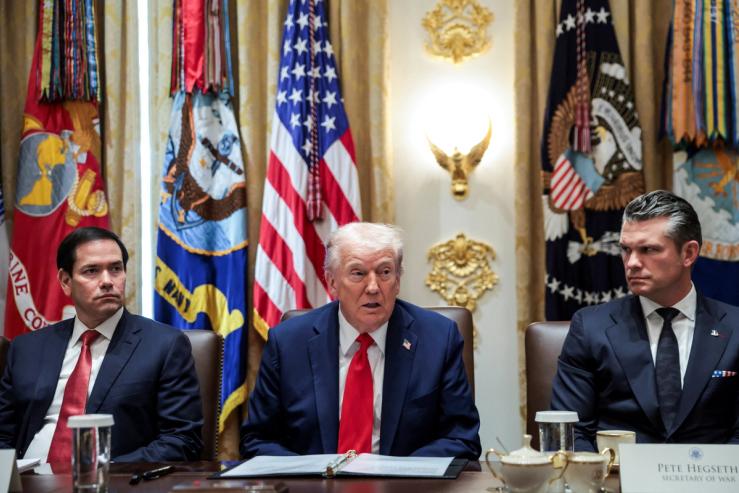what’s at stake
The Trump administration’s military strikes on alleged drug boats off the coast of Venezuela are sparking questions about whether its ultimate goal is regime change, or otherwise nudging new leadership into power in Caracas.
President Donald Trump and his aides have not publicly called for Venezuelan leader Nicolás Maduro’s ouster, nor have they described it as the mission of their military buildup in the region.
But The New York Times reported last month that administration officials are discussing an aggressive military campaign that could force the socialist authoritarian leader out of power, a push being led by Secretary of State Marco Rubio (who effectively took over the administration’s Venezuela policy earlier this year).
Since the Times report, the US military has launched strikes on more alleged drug vessels in the Caribbean, while Trump has formally notified Congress that the US is at war against drug cartels.
In this article:
who’s making the case
Daniel Batlle, an adjunct fellow at the Hudson Institute and a former George W. Bush administration official, argues that deposing Maduro is the right way to go — but that Trump’s apparent strategy is flawed:
Nicolás Maduro lost the July 2024 presidential elections and governs without legitimacy. He is responsible for widespread suffering and political repression, forcing 8 million Venezuelans into exile. His regime’s misrule, combined with its alliance with transnational criminal organizations, has destabilized the entire region. Maduro has even threatened to invade neighboring Guyana. For these reasons, ending the Maduro regime would be transformative for Venezuela and Latin America.
Importantly, Venezuela possesses a capable democratic opposition — led by María Corina Machado and president-elect Edmundo González — that is prepared to govern responsibly.
However, the Trump administration’s current military deployment in the Caribbean appears designed primarily to signal US resolve and expand Washington’s range of options rather than to prepare for regime change.
The administration may be seeking to pressure Maduro into making concessions, but its specific objectives remain ambiguous. Even as the administration has escalated its rhetoric and ended a diplomatic channel with the regime, it continues to coordinate with the regime on deportation flights and has maintained a license that allows Chevron to export Venezuelan oil.
Any attempt to forcibly remove Maduro from power would require extensive preparation: building congressional support, assembling a coalition of regional partners, pre-positioning substantially larger forces, and developing detailed plans for post-regime stabilization. The administration understands the profound risks involved — particularly the catastrophic damage to US credibility if such an operation failed or descended into prolonged conflict.
Geoff Ramsey, a senior fellow at the Atlantic Council, says that the US should pull diplomatic levers — not military ones — to facilitate a democratic transition in Venezuela:
Venezuelans deserve democracy. And the United States should use the sizeable economic and diplomatic leverage that it has to try and forge a roadmap for a transition. But military intervention in Venezuela would not be risk-free or straightforward. Venezuela is not Panama in 1989, nor is it Grenada in 1983.
Complicating matters further is the Bolivarian Militia, which Maduro has made a point of carrying out training exercises with in recent weeks. While the true number of militia members is far less than the 4.5 million figure cited by Maduro, the existence of a highly ideological network of armed supporters should serve as a warning for anyone who believes military intervention will be a cakewalk. If President Trump is not careful, US military action in Venezuela could see the country collapse into chaos, potentially fueling a Libya-style meltdown just a three-hour flight from Miami.
Instead, Washington should shape incentives inside the regime to advance reforms, free political prisoners, and restore the country’s democratic institutions.
In his first administration, President Trump explored a “democratic transition framework” for Venezuela. The road map offered Caracas phased sanctions relief in exchange for the creation of a joint transitional government made up of both the opposition and ruling party. This plan is just as relevant today as it was then.
Notable
- Senate Republicans voted down an effort by Democrats on Wednesday to curtail Trump’s ability to wage war against Venezuelan drug cartels, Semafor reported.
- Trump has called off diplomatic engagement with Venezuela, Bloomberg reported earlier this week.
- Venezuela is “on edge over Trump regime change whispers,” The Guardian reported.


